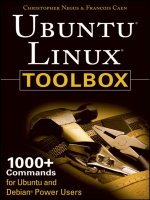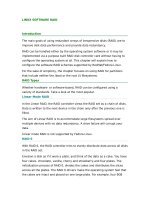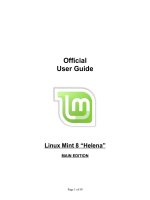Linux Hardware Compatibility HOWTO
Bạn đang xem bản rút gọn của tài liệu. Xem và tải ngay bản đầy đủ của tài liệu tại đây (433.37 KB, 33 trang )
Linux Hardware Compatibility HOWTO
Patrick Reijnen,
< (remove
both "antispam.")>
v99.3, 28 September 1999
This document lists most of the hardware supported by Linux and helps you locate any necessary drivers.
1.Introduction
• 1.1 Welcome
• 1.2 Copyright
• 1.3 System architectures
2.Computers/Motherboards/BIOS
• 2.1 Specific system/motherboard/BIOS
• 2.2 Unsupported
3.Laptops
• 3.1 Specific laptops
• 3.2 PCMCIA
4.CPU/FPU
5.Memory
Linux Hardware Compatibility HOWTO 1
6.Video cards
• 6.1 Diamond video cards
• 6.2 SVGALIB (graphics for console)
• 6.3 XFree86 3.3.2
• 6.4 S.u.S.E. X−Server
• 6.5 Commercial X servers
7.Controllers (hard drive)
• 7.1 Alpha, Beta drivers
8.Controllers (hard drive RAID)
9.Controllers (SCSI)
• 9.1 Supported
• 9.2 Alpha, Beta drivers
• 9.3 Unsupported
10.Controllers (I/O)
11.Controllers (multiport)
• 11.1 Non−intelligent cards
• 11.2 Intelligent cards
12.Network adapters
• 12.1 Supported
• 12.2 Alpha, Beta drivers
• 12.3 Unsupported
Linux Hardware Compatibility HOWTO
6.Video cards 2
13.Sound cards
• 13.1 Supported
• 13.2 Alpha, Beta drivers
• 13.3 Unsupported
14.Hard drives
• 14.1 Unsupported
15.Tape drives
• 15.1 Supported
• 15.2 Alpha, Beta drivers
• 15.3 Unsupported
16.CD−ROM drives
• 16.1 Supported
• 16.2 Alpha, Beta drivers
• 16.3 Notes
17.CD−Writers
18.Removable drives
19.Mice
• 19.1 Supported
• 19.2 Alpha, Beta drivers
• 19.3 Notes
Linux Hardware Compatibility HOWTO
13.Sound cards 3
20.Modems
21.Printers/Plotters
• 21.1 Ghostscript
22.Scanners
• 22.1 Supported
• 22.2 Alpha, Beta drivers
• 22.3 Unsupported
23.Other hardware
• 23.1 Amateur Radio
• 23.2 VESA Power Savings Protocol (DPMS) monitors
• 23.3 Touch screens
• 23.4 Terminals on serial port
• 23.5 Joysticks
• 23.6 Video capture boards / Frame Grabbers / TV tuner
• 23.7 Digital Camera
• 23.8 UPS
• 23.9 Multifunction boards
• 23.10 Data acquisition
• 23.11 Watchdog timer interfaces
• 23.12 Miscellaneous
24.Related sources of information
25.Acknowledgments
26.Appendix A. S3 cards supported by XFree86 3.3.x.
Linux Hardware Compatibility HOWTO
20.Modems 4
27.Appendix B. Supported PCMCIA cards
• 27.1 Ethernet cards
• 27.2 Fast Ethernet (10/100baseT) adapters
• 27.3 Token−ring adapters
• 27.4 Wireless network adapters
• 27.5 ISDN
• 27.6 Modem and serial cards
• 27.7 Memory cards
• 27.8 SCSI adapters
• 27.9 ATA/IDE CD−ROM adapters
• 27.10 Multifunction cards
• 27.11 ATA/IDE card drives
• 27.12 ATA/IDE Interface Cards
• 27.13 Parallel port cards:
• 27.14 Miscellaneous cards
• 27.15 Working on ...
• 27.16 Unsupported
28.Appendix C. Supported Parallel Port devices
• 28.1 Ethernet
• 28.2 Hard drives
• 28.3 Tape drives
• 28.4 CD−ROM drives
• 28.5 Removable drives
• 28.6 IDE Adapter
• 28.7 SCSI Adapters
• 28.8 Digital Camera
• 28.9 PCMCIA parallel port cards
29.Appendix D. Plug and Play devices
30.Appendix E. Linux incompatible Hardware
31.Glossary
Linux Hardware Compatibility HOWTO
27.Appendix B. Supported PCMCIA cards 5
1.Introduction
NOTE: USB is not yet supported by Linux.
1.1 Welcome
Welcome to the Linux Hardware Compatibility HOWTO. This document lists most of the hardware
components (not computers with components build in) supported by Linux, so reading through this document
you can choose the components for your own Linux computer. As the list of components supported by Linux
is growing rapidly, this document will never be complete. So, when components are not mentioned in this
HOWTO, the only reason will be that I don't know they are supported. I simply have not found support for
the component and/or nobody has told me about support.
Subsections titled 'Alpha, Beta drivers' list hardware with alpha or beta drivers in varying degrees of
usability. Note that some drivers only exist in alpha kernels, so if you see something listed as supported but
isn't in your version of the Linux kernel, upgrade.
Some devices are supported by binary−only modules; avoid these when you can. Binary−only modules are
modules which are compiled for ONE kernel version. The source code for these modules has NOT been
released. This may prevent you from upgrading or maintaining your system.
Linus Torvalds says "I allow binary−only modules, but I want people to know that they are _only_ ever
expected to work on the one version of the kernel that they were compiled for"
See for information on source code availability of
components.
The latest version of this document can be found on
SunSite and all the usual mirror
sites. Translations of this and other Linux HOWTO's can be found at
and
/>If you know of any Linux hardware (in)compatibilities not listed here please let me know, just send mail.
Still need some help selecting components after reading this document? Check the "Build Your Own PC" site
at />Want to have a preconfigured Linux system? Have a look at />1.2 Copyright
Copyright 1997, 1998, 1999 Patrick Reijnen
This HOWTO is free documentation; you can redistribute it and/or modify it under the terms of the GNU
General Public License as published by the Free software Foundation; either version 2 of the license, or (at
your option) any later version.
Linux Hardware Compatibility HOWTO
1.Introduction 6
This document is distributed in the hope that it will be useful, but without any warranty; without even the
implied warranty of merchantability or fitness for a particular purpose. See the GNU General Public License
for more details. You can obtain a copy of the GNU General Public License by writing to the Free Software
Foundation,, Inc., 675 Mass Ave, Cambridge, MA 02139, USA.
If you use this or any other Linux HOWTO's in a commercial distribution, it would be nice to send the
authors a complimentary copy of your product.
1.3 System architectures
This document only deals with Linux for Intel platforms, for other platforms check the following:
• ARM Linux
/>• Linux/68k
/>• Linux/8086 (The Embeddable Linux Kernel Subset)
/>• Linux/Alpha
/>• Linux/MIPS
• Linux/PowerPC
/>• Linux for Acorn
/>• Linux for PowerMac
/>2.Computers/Motherboards/BIOS
ISA, VLB, EISA, and PCI buses are all supported.
2.1 Specific system/motherboard/BIOS
• IBM PS/2 MCA systems
Supported since kernel version 2.0.7, but only for the stable kernel releases. For information you can
look at the Micro Channel Linux Home Page ( Software for
MCA systems can be found at Information on the MCA SCSI
subsystem can be found at http//www.uni−mainz.de/~langm000/linux.html.
• EFA E5TX−AT motherboard has a solvable problem with RedHat Linux 5.0 and possibly other
Linux Hardware Compatibility HOWTO
1.3 System architectures 7
versions of Linux. It spontaneously reboots while probing hardware. To solve, update BIOS to
version 1.01. Get the BIOS update at />• The Edom MP080 motherboard needs a BIOS flash for Linux to work. Without the BIOS flash Linux
will reboot during the hardware scan. for the BIOS flash check
and />• The Zida 6MLX motherboard with PII Intel LX chipset is mentioned only to work with Linux when
the PII cache is disabled in BIOS. BIOS upgrade does not solve the problem. Symptom is random
reboots during or shortly after system boot.
Many new PCI boards are causing a couple of failure messages during boot time when "Probing PCI
Hardware". The procedure presents the folowing message
Warning : Unknown PCI device (8086:7100). Please read include/linux/pci.h
It tells you to read the pci.h file. From this file is the following quote
PROCEDURE TO REPORT NEW PCI DEVICES
We are trying to collect information on new PCI devices, using
the standard PCI identification procedure. If some warning is
displayed at boot time, please report
− /proc/pci
− your exact hardware description. Try to find out
which device is unknown. It may be you mainboard chipset.
PCI−CPU bridge or PCI−ISA bridge.
− If you can't find the actual information in your hardware
booklet, try to read the references of the chip on the board.
− Send all that to linux−pcisupport@cao−vlsi.ibp.fr,
and I'll add your device to the list as soon as possible
BEFORE you send a mail, please check the latest linux releases
to be sure it has not been recently added.
Thanks
Frederic Potter.
Normally spoken you motherboard and the unknown PCI devices will function correctly.
2.2 Unsupported
• Supermicro P5MMA with BIOS versions 1.36, 1.37 and 1.4. Linux will not boot on this
motherboard. A new (beta) release of the BIOS which makes Linux boot, is available at
ftp.supermicro.com/mma9051.zip
• Supermicro P5MMA98. Linux will not boot on this motherboard. A new (beta) release of the BIOS
which makes Linux boot, is available at ftp.supermicro.com/a98905.zip?
• DataExpert Corp. ExpertColor TX531 V1.0 motherboard with chipset ACER M1531 (Date: 9729,
TS6) and ACER M1543 (Date: 9732 TS6) seems to present not reproducible segmentations faults,
kernel oops and kernel hangs under heavy load and tape access. The problem seems to be the
PCI−bus, respectively the ACER chipset.
Linux Hardware Compatibility HOWTO
2.2 Unsupported 8
3.Laptops
For more information about Linux and laptops, the following site is a good starting point.
• Linux Laptop Homepage
/>Other information related to laptops can be found at the following sites:
• Avanced Power Management
/>• Notebook battery status
/>• non−blinking cursor
/>• other general info
ftp://tsx−11.mit.edu/pub/linux/packages/laptops/
3.1 Specific laptops
• Compaq Concerto (pen driver)
/>• Compaq Contura Aero
/>• IBM ThinkPad
/>• IBM Thinkpad 770 series
/>• NEC Versa M and P
:80/~nelson/versa−linux/
• Tadpole P1000
/>• Tadpole P1000 (another one)
• TI TravelMate 4000M
/>• TI TravelMate 5100
• Toshiba Satellite Pro 400CDT
kg−teltow.mpg.de/~burger/T400CDT−Linux.html
Linux Hardware Compatibility HOWTO
3.Laptops 9
3.2 PCMCIA
• PCMCIA
/>PCMCIA drivers currently support all common PCMCIA controllers, including Databook TCIC/2, Intel
i82365SL, Cirrus PD67xx, and Vadem VG−468 chipsets. Motorola 6AHC05GA controller used in some
Hyundai laptops is not supported. See Appendix B for a list of supported PCMCIA cards.
4.CPU/FPU
Intel/AMD/Cyrix 386SX/DX/SL/DXL/SLC, 486SX/DX/SL/SX2/DX2/DX4 are supported. Intel Pentium,
Pentium Pro and Pentium II, Pentium III (regular and Xeon versions) ans Celeron also work. AMD K5 and
K6 work good, although older versions of K6 should be avoided as they are buggy. Setting "internal cache"
disabled in bios setup can be a workaround. AMD K6−2 and K6−3 also work. Some early K6−2 300Mhz
have problems with the system chips. Cyrix 6x86 works out of the box.
Also IDT Winchip C6−PSME2006A processors are supported under Linux ( ).
Linux has built−in FPU emulation if you don't have a math coprocessor.
Experimental SMP (multiple CPU) support is included in kernel 1.3.31 and newer. Check the Linux/SMP
Project page for details and updates.
• Linux/SMP Project
/>Advanced multi−media effects built into the Cyrix MediaGX ar not supported.
A few very early AMD 486DX's may hang in some special situations. All current chips should be okay and
getting a chip swap for old CPU's should not be a problem.
ULSI Math*Co series has a bug in the FSAVE and FRSTOR instructions that causes problems with all
protected mode operating systems. Some older IIT and Cyrix chips may also have this problem.
There are problems with TLB flushing in UMC U5S chips in very old kernels. (1.1.x)
• enable cache on Cyrix processors
/>• Cyrix software cache control
/>• Cyrix 5x86 CPU register settings
/> Linux Hardware Compatibility HOWTO
3.2 PCMCIA 10
5.Memory
All memory like DRAM, EDO and SDRAM can be used with Linux. There is one thing you have to look at:
normally the kernel is not supporting more than 64 Mb of memory. When you add more than 64 Mb of
memory you have to add the following line to your LILO configuration file.
append="mem=<number of Mb>M"
So, when you have 96 Mb of memory this should become
append="mem=96M"
Don't type a number higher than the number Mb you really have. This can present unpredictable crashes.
6.Video cards
Linux will work with all video cards in text mode, VGA cards not listed below probably will still work with
mono VGA and/or standard VGA drivers.
If you're looking into buying a cheap video card to run X, keep in mind that accelerated cards (ATI Mach,
ET4000/W32p, S3) are MUCH faster than unaccelerated or partially accelerated (Cirrus, WD) cards.
``32 bpp'' is actually 24 bit color aligned on 32 bit boundaries. It does NOT mean the cards are capable of 32
bit color, they still display 24 bit color (16,777,216 colors). 24 bit packed pixels modes are not supported in
XFree86, so cards that can do 24 bit modes to get higher resolutions in other OS's are not able to do this in X
using XFree86. These cards include Mach32, Cirrus 542x, S3 801/805/868/968, ET4000, and others.
AGP (Accelerated Graphics Port) support is growing fast. Most of the X−servers (both freely available and
commercial versions) have more or less support for AGP.
6.1 Diamond video cards
Most currently available Diamond cards ARE supported by the current release of XFree86. Early Diamond
cards may not be officially supported by XFree86, but there are ways of getting them to work. Diamond is
now actively supporting the XFree86 Project.
Linux Hardware Compatibility HOWTO
5.Memory 11
6.2 SVGALIB (graphics for console)
• VGA
• EGA
• ARK Logic ARK1000PV/2000PV
• ATI VGA Wonder
• ATI Mach32
• Cirrus 542x, 543x
• OAK OTI−037/67/77/87
• S3 (limited support)
• Trident TVGA8900/9000
• Tseng ET3000/ET4000/W32
6.3 XFree86 3.3.2
Accelerated
• ARK Logic ARK1000PV/VL, ARK2000PV/MT
• ATI Mach8
• ATI Mach32 (16 bpp supported for cards with RAMDAC ATI68875, AT&T20C49x, BT481 and
2Mb video ram)
• ATI Mach64 (16/32 bpp supported for cards with RAMDAC ATI68860, ATI68875, CH8398,
STG1702, STG1703, AT&T20C408, 3D Rage II, internal, IBM RGB514)
• Chips & Technologies 64200, 64300, 65520, 65525, 65530, 65535, 65540, 65545, 65546, 65548,
65550, 65554
• Cirrus Logic 5420, 542x/5430 (16 bpp), 5434 (16/32 bpp), 5436, 544x, 546x, 5480, 62x5, 754x
• Diamond Viper 330
• Gemini P1 (ET6000 chip)
• IBM 8514/A
• IBM XGA−I, XGA−II
• IIT AGX−010/014/015/016 (16 bpp)
• Matrox MGA2064W (Millennium)
• Matrox MGA1064SG (Mystique)
• Number Nine Imagine I128
• Oak OTI−087
• S3 732 (Trio32), 764 (Trio64), Trio64V+, 801, 805, 864, 866, 868, 86C325 (ViRGE), 86C375
(ViRGE/DX), 86C385 (ViRGE/GX), 86C988 (ViRGE/VX), 911, 924, 928, 964, 968
♦ see Appendix A for list of supported S3 cards
• SiS 86c201, 86c202, 86c205
• Trident 9440, 96xx, Cyber938x
• Tseng ET4000/W32/W32i/W32p, ET6000
• Weitek P9000 (16/32 bpp)
Linux Hardware Compatibility HOWTO
6.2 SVGALIB (graphics for console) 12
♦ Diamond Viper VLB/PCI
♦ Orchid P9000
• Western Digital WD90C24/24A/24A2/31/33
Unaccelerated
• Alliance AP6422, AT24
• ATI VGA Wonder series
• Avance Logic AL2101/2228/2301/2302/2308/2401
• Cirrus Logic 6420/6440, 7555
• Compaq AVGA
• DEC 21030
• Genoa GVGA
• MCGA (320x200)
• MX MX68000/MX68010
• NCR 77C22, 77C22E, 77C22E+
• NVidia NV1
• Oak OTI−037C, OTI−067, OTI−077
• RealTek RTG3106
• SGS−Thomson STG2000
• Trident 8800CS, 8200LX, 8900x, 9000, 9000i, 9100B, 9200CXr, 9320LCD, 9400CXi, 9420,
9420DGi, 9430DGi
• Tseng ET3000, ET4000AX
• VGA (standard VGA, 4 bit, slow)
• Video 7 / Headland Technologies HT216−32
• Western Digital/Paradise PVGA1, WD90C00/10/11/30
Monochrome
• Hercules mono
• Hyundai HGC−1280
• Sigma LaserView PLUS
• VGA mono
Alpha, Beta drivers
• EGA (ancient, from c. 1992)
/> Linux Hardware Compatibility HOWTO
Unaccelerated 13









